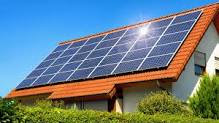Solar energy is the
radiant light and heat from the Sun that is harnessed using a range of
ever-evolving technologies. The Sun is an essential source of renewable energy,
and its technologies are broadly characterized as either passive solar or
active solar depending on how they capture and distribute solar energy or
convert it into solar power.
Solar was once
considered a futuristic concept, but today it is in the mainstream of power
generation for homes and offices. Due to its immense cost-effectiveness many individuals
are buying into the idea of solar energy.
In this article we will
explore the basis of solar and how it works. Thus at the end you will have sufficient
knowledge needed to adopt this latest energy production technology.
How it works
Solar energy works by
converting sunlight into electricity or heat. This can be done using a variety
of technologies, but the most common is photovoltaic (PV). PV cells are made of
semiconductor materials that absorb sunlight and convert it into electricity.
Here is a simplified breakdown of how solar works;
1.
The core of any solar installed system
is the solar
panels. Solar panels are made up of silicon which contains PV cells.
When sunlight hits the solar panel, the PV cells become agitated and convert
the sunlight into electricity.
2. The
electricity generated is called Direct Current (DC). This DC can only power
solar enabled appliances. To thus convert DC to alternate Current (AC) an inverter
is introduced to do the job. AC is the type of energy appliances used at home
and offices need to function.
3. The
excess energy produced by the system can be stored in batteries which would
serve as backup when the sun goes down.
4. Different types of solar panels
There are two main
types of solar panels: monocrystalline and polycrystalline. Monocrystalline
solar panels are the most efficient type of solar panel, but they are also the
most expensive. Mono solar panels also last longer as the life span is as long
as 25 to 30 years.
Polycrystalline solar
panels are less efficient than monocrystalline solar panels, but they are also
less expensive.
Benefits of solar energy
Solar energy has a
number of benefits, including:
-
It is a clean and renewable source of
energy. Solar energy does not produce any greenhouse gas emissions or other
pollutants.
-
It can help to reduce energy costs.
Solar panels can generate electricity on-site, which can help to reduce your
reliance on the grid and save you money on your utility bills.
-
With solar you are guaranteed constant
power supply; depending on your choice though. This is because it provides a degree
of energy self-sufficiency and reduces dependence on fossil fuels and central
power grid.
-
In cases where your intention is to sell
your property it can increase the value of your property. Studies have shown
that homes with solar panels sell for more money than homes without solar
panels.
-
Also the solar industry has created
massive jobs from production right down to installation. The solar industry is
one of the fastest-growing industries in the world, and it is creating jobs at
a rapid pace.
Drawbacks of solar energy
Solar energy also has a
few drawbacks, including:
-
The upfront cost of solar panels can be
high. However, the cost of solar panels has fallen dramatically in recent
years, and there are a number of financing options available to help make solar
panels more affordable.
-
Solar panels only generate electricity
when the sun is shining. This means that you will need to have a backup source
of electricity, such as a battery or generator, for when the sun is not
shining.
-
Solar panels can require a lot of space.
If you do not have a lot of space on your roof, you may not be able to install
solar panels.
How to choose the right solar system for your needs and budget
When choosing a solar
system for your needs and budget, there are a few things you need to consider:
1.
Your energy needs. How much electricity
do you use on a monthly basis? This will help you to determine the size of the
solar system you need.
2.
Your budget. How much money can you
afford to spend on a solar system? There are a number of financing options
available to help make solar panels more affordable.
3.
Your roof. Do you have enough space on
your roof to install solar panels? Also, make sure that your roof is in good
condition and can support the weight of solar panels.
Conclusion
Solar energy is a
clean, renewable source of energy that can offer a number of benefits to
homeowners and businesses alike. If you are considering installing solar
panels, be sure to do your research and choose a solar system that is right for
your needs and budget.
Its long-term
cost-effectiveness makes it an attraction for business owners and households.
This is in addition to the fact that it has no harmful impact on the
environment and provides dependable energy.
Thus if you desire to
harness the power of the sun and promote a sustainable future, then solar is
the right choice for you.
Are you considering the
idea of embracing this trending technology? Are you convinced that solar it
will help you save cost and provide you with constant and dependable energy?
Do you thus need the
serves of an expert that will give you the best set-up for your home or office?
If you answered YES to
these questions, then LUMIA Technologies is
here for here. To know more about LUMIA Technologies CLICK HERE.
